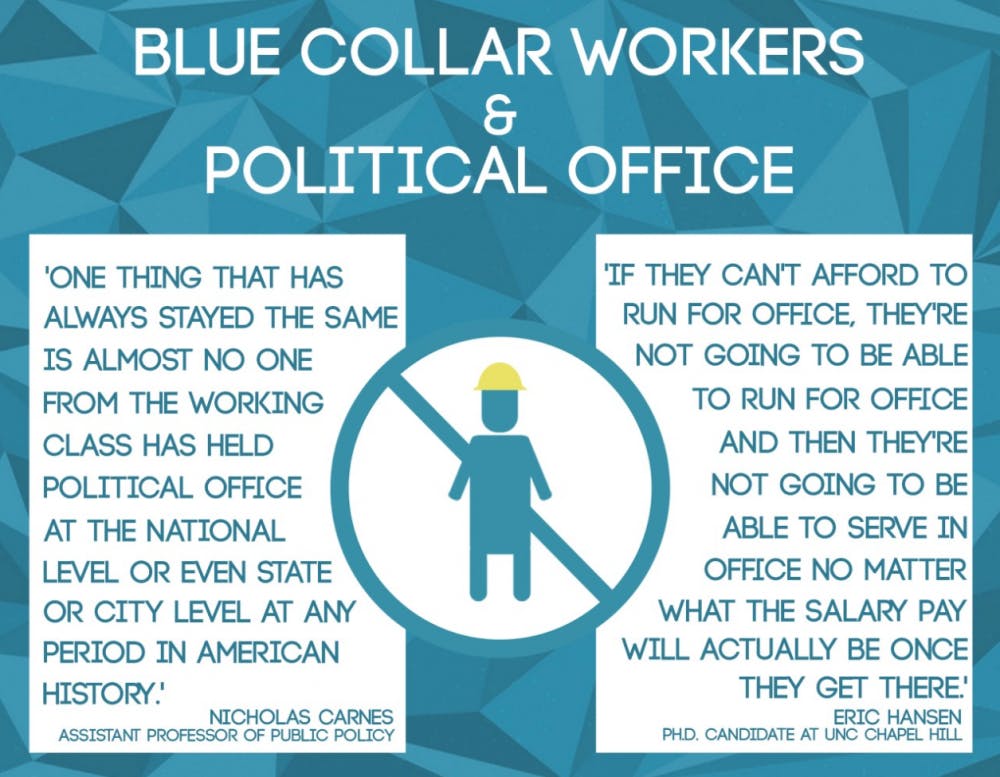A new study found that raising legislative salaries will not encourage more blue-collar workers to enter political office.
Nicholas Carnes, assistant professor at the Sanford School of Public Policy, and Eric Hansen, a Ph.D. candidate at the University of North Carolina at Chapel Hill, used a 2012 survey and observational data from 1979, 1993, 1995 and 2007 to conclude that even when states offer higher pay for legislators, these offices are still dominated by white-collar professionals.
"One thing that has always stayed the same is almost no one from the working class has held political office at the national level or even state or city level at any period in American history,” Carnes said.
Legislative salaries vary among states. For instance, New Hampshire only pays $200, but California, New York and Michigan pay more than $75,000 each year.
The difficulty of running in the first place due to financial and time burdens prevents blue-collar workers from running, Carnes and Hansen explained.
“That’s probably where people are getting weeded out,” Hansen said. “If they can’t afford to run for office, they’re not going to be able to run for office, and then they’re not going to be able to serve in office no matter what the salary pay will actually be once they get there.”
Often, current leaders in the government or in interest groups will support or promote a candidate for office. Hansen noted, however, that most blue-collar workers do not have those connections—either they do not know how to run or are not asked to run by people in positions of power.
The study’s importance
Carnes explained that many people think if politicians were paid more, it would make public office more accessible for middle-income and working-class people.
Comparing the shortage of blue-collar workers to the shortage of women in office, he noted that this occurrence tilts public policy on economic issues—just like the lack of female legislators impacts public policy on gender issues.
“People in office tend to vote reflecting their own economic status,” Hansen said. “In Congress, for instance, wealthy people are much more likely to vote for economic bills that advance the interests of the wealthy in the U.S., and blue-collar workers tend to vote for bills that redistribute income and government benefits.”
Hansen also said that the conclusion reached in the study impacts taxpayers because the quality of government depends on how much legislators are paid.
“How much we pay our legislators affects what kind of government we get in return," he said. "Legislators who are paid more tend to show up for more votes, and they tend to introduce more legislation."
Carnes acknowledged though the difficulty of determining a fair amount of pay.
“One of the negative consequences of paying people more is that we tend to shut out more regular people,” Hansen said.
Possible solutions?
One potential fix is to offset practical burdens for people who want to run for office, Carnes said. In some states, such as New Jersey, unions conduct candidate support programs, which attempt to train working-class people on how to run a campaign.
Hansen noted that these programs guide candidates through the election process, helping them promote their candidacy and talk to the media.
Although there is not much empirical evidence on the programs, they seem promising, Carnes said.
Hansen added that even though the training programs might encourage more organization from the grass-roots level, change might not occur for several years.
“But that doesn’t mean things won’t change ever,” Hansen said.
Future research
By compiling more data on occupational backgrounds of state legislators, Hansen noted that the research team hopes to look more systematically across state legislatures to strengthen study conclusions.
Carnes also plans to look at data from other countries, as this shortage of blue-collar workers in the legislature seems to be a global problem, he said.
“If no one does anything, this isn’t a problem that’s going to change,” Carnes said.
Yet, citing the steady growth of women in the government, Carnes expressed optimism for the future.
“We know how to solve this issue. It takes people who work in and around government to pay attention to this problem," he said. “You want everyone who is represented to have a voice at the table because these are decisions that affect all of us."
Get The Chronicle straight to your inbox
Signup for our weekly newsletter. Cancel at any time.

